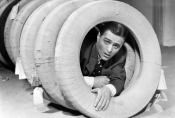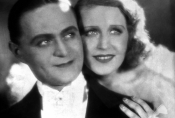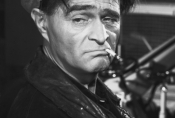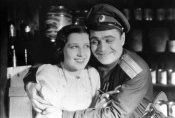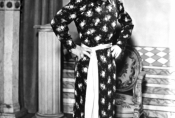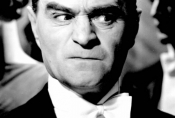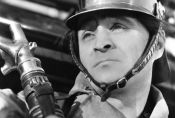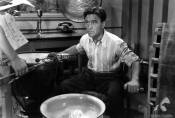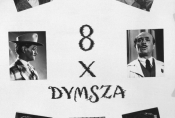Adolf Dymsza
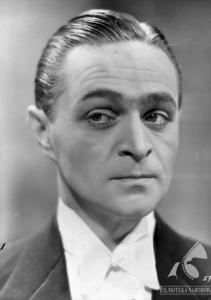
Real name: Adolf Bagiński. Born on April 7, 1900 in Warsaw, died on August 20,1975 in Góra Kalwaria. One of the most popular Polish comedians. He debuted in 1918, and later went on to perform in theatres in Warsaw, but also in Grodno, Minsk, and after World War Two – in Lodz. During the German occupation he continued acting in Nazi-controlled theatres (most Polish actors refused to work for the occupiers), which earned him a five-year ban on appearing on Warsaw’s stages from the Polish Actors’ Guild after the liberation. After the war, he played several notable film roles, but he was never quite as popular as before 1939.
His film debut was most likely Miłość przez ogien i krew/Love Through Fire and Blood by Jan Kucharski (there is no surviving copy of the film). Even the earliest silent cinema productions showcased his unique comic talent. His career took off in the 1930s, when the sound film blossomed. Critics unanimously considered him a very talented actor, who could lend even the most grotesque and farcical characters tragic undertones, thus adding a new layer of meaning to the film. This was the case with films such as Ułani, ułani, chłopcy malowani/Uhlans, Beautiful Boys by Mieczysław Krawicz, Każdemu wolno kochać/Everyone Is Entitled To Love by Michał Waszyński or Antek Policmajster/Antek, the Police Chief by Krawicz. He played complex characters, sometimes two characters at once, as in Romeo i Julcia/Romeo and Julie by Jan Nowina-Przybylski, or Wacuś and Bolek i Lolek/ Bolek and Lolek by Michał Waszyński. In post-war socialist-realist comedy, Sprawa do Załatwienia/A Case to Settle directed by Jan Rybkowski and Jan Fethke, he played as many as eight supporting characters, all of whom were trying to prevent the heroine from settling the titular case in Warsaw. Dymsza’s outstanding performance in the film garnered it an element of unpretentious humour, which makes it a palatable comedy even now, in spite of its brazen communist ideology.
Dymsza’s comic talent was undeniable, yet he did not avoid serious roles, even though he was almost never cast as a non-comic character. Still, he was praised for those serious roles in particular. Critics claimed that none of the directors of the interwar period were able to offer him anything that would match his talent, despite the fact that he had roles written specially for him, and in 1935 four films with him in the lead role were released (this was the reason why 1935 was dubbed “Dymsza year”). The actor sang, danced, and parodied others, creating “grotesque comedy of the highest order” – his style was inimitable and unique: determined, sharp movements, an expressive face, and a breaking, yet powerful voice. He came up with the idea of the first film featuring Dodek – Dymsza’s alter ego: Sto metrów miłości/One Hundred Metres of Love by Michał Waszyński. Dodek returned in various guises in other films by this director – Dodek na froncie/Dodek at the War Front, 30 karatów szczęścia/30 Carats of Happiness and Sportowiec mimo woli [Accidental athlete] by Mieczysław Krawicz, as well as in Pan Dodek/Mr. Dodek by Jan Łomnicki.
After the war Dymsza did not act as much, but almost each of his roles is worth remembering and noting. The unpretentious humour and profound plebeian goodness of the streetwise characters he played his whole life with gusto gained him popularity and earned him a place in the pantheon of great Polish actors. One of his last roles was in the film Mój stary/My Old Man by Janusz Nasfeter. It is a complete departure from his funny-man image – he created the sad figure of a lame old man. His talent, however, always shone brightest in comedy.
He is the father of actress Anita Dymszówna.
Artur Majer
Selected filmography
-
1938
PAWEL AND GAWEL
reż. Mieczysław Krawicz
-
1948
THE TREASURE
reż. Leonard Buczkowski
